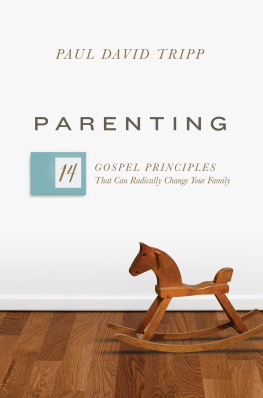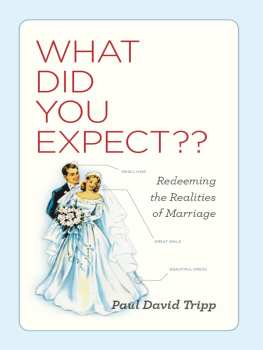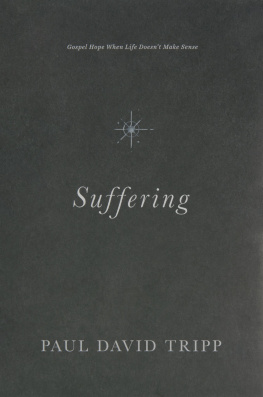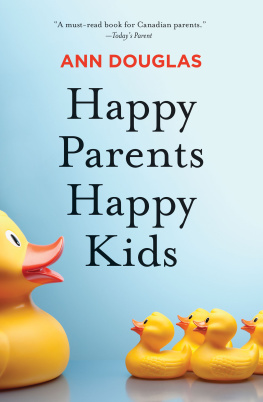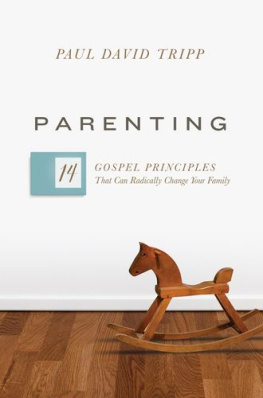Table of Contents
Landmarks
Crossway Books by Paul David Tripp:
Awe: Why It Matters for Everything We Think, Say, and Do (2015)
Come, Let Us Adore Him: A Daily Advent Devotional (2017)
Dangerous Calling: Confronting the Unique Challenges of Pastoral Ministry (2012)
My Heart Cries Out: Gospel Meditations for Everyday Life (2019)
New Morning Mercies: A Daily Gospel Devotional (2014)
Parenting: 14 Gospel Principles That Can Radically Change Your Family (2016)
Redeeming Money: How God Reveals and Reorients Our Hearts (2018)
Sex in a Broken World: How Christ Redeems What Sin Distorts (2018)
A Shelter in the Time of Storm: Meditations on God and Trouble (2009)
Suffering: Gospel Hope When Life Doesnt Make Sense (2018)
What Did You Expect? Redeeming the Realities of Marriage (2010)
Whiter Than Snow: Meditations on Sin and Mercy (2008)
Principle: Recognizing what you are unable to do is essential to good parenting.
It was a public scene. If you were near, it was impossible not to stop whatever you were doing and look and listen. And for me it was impossible not to wonder how many times that same scene was repeated by parents that same day, who meant well, but who had lost their way. I know the belief that was behind what that mother did in the mall that day. I know that belief because in my earlier parenting days I bought into it too. In her heart of hearts that mom felt she was being a good and faithful parent, that she was doing exactly what a parent should do in that situation. And I dont doubt her motives, but what she did was propelled by something that many parents believe, but that is dead wrong.
Unaware of those of us around her, she hurled accusations and threats at her little boy. Her face was stern and her voice was loud, and she just knew that talk would change that little boy. She knew that what he did, he would never be so bold as to do again. She was letting him have it, and she believed that letting him have it would change him. He quietly cried as she was so up in his face that Im sure he could not only hear her words, but feel her breath. Yes, he would remember his moms anger, but Im not so sure that anger would do what was intended. She grabbed his hand and walked away, still making her point as he dragged on behind her.
Do I think that that mom loved her little boy? Yes, I think she probably did. But the way she parented him was shaped by buying into something that just wont ever work.
Powerless
You may be wondering what the title for this section of this chapter has to do with the story you just read. That mother was in her sons face with threatening anger because she assigned to herself power that she doesnt have. Ive bought into this delusion. Ive heard parents verbalize it. If its the last thing I do, Ill get my children to believe. I will discipline the hell out of my children. Its my job to ensure that they do what is right. If I do nothing else, I will send children out into the world who are prepared to live right. After Im done with him, hell never even think of doing that again. The assessment in these statements that children need to change is right. The deep desire for that change which motivates a parent is right. The commitment to work for that change is right. Then what is wrong with each of these statements? Each of them assumes power on the part of parents that no parent has, and that assumption creates all kinds of parenting trouble.
If you are going to be what God has designed you to be as a parent and do what hes called you to do, you must confess one essential thing. This confession has the power to change much about the way you act and react toward your children. It is vital that you believe and admit that you have no power whatsoever to change your child . Now think again from the perspective of the gospel of Jesus Christ, which is the central theme of the book that is our most reliable parenting guide. If any human being possessed the power to create lasting change in any other human being, again, Jesus would not have had to come! The incarnation, life, death, and resurrection of Jesus stand as clear historical evidence that human power for change does not exist. The reason God went to such an extreme and elaborate extent in controlling the events of history so that at just the right time his Son would come and do for us what we could not do ourselves, is because there was no other way.
Parenting is not about exercising power for change in your children. Parenting is about your humble faithfulness in being willing to participate in Gods work of change for the sake of your children. Parents, heres what you need to understand: God has given you authority for the work of change, but has not granted you the power to make that change happen. But we buy into the delusion of thinking again and again that that power is ours. We think that if we speak just a little bit louder, or stand a little bit closer, or make the threat a little bit scarier, or the punishment a little more severe, then our children will change. And because the change doesnt happen, we tend to bring it on even stronger.
Oh, sure, you can scare or reward your children into temporary change. You can temporarily buy them off or scare them off. You can exercise temporary control over a childs behavior, but what needs to change in order for that change to last and bear fruit is something inside the child. Let me say it this way: the behavior of your children is symptomatic of what is going on inside your children. Inside change always precedes lasting outside change. In parenting, what you are dealing with is way deeper than the need for behavioral change. What youre always dealing with is the need for heart change, and we simply have no power at all to change another persons heart. (If you want to know more about that, there is a chapter coming dedicated to that discussion.)
Now heres the point: if as a parent you think that you have power that you dont have, you will do things that you should not do and you will fail to do things that are vital to do. When you think your job is to change your child and youve been given the power to do it, your parenting will tend to be demanding, aggressive, threatening, and focused on rules and punishments. In this kind of parenting you are working to make your children into something rather than working to help them to see something and seek something. In this form of parenting, it is all about you and your children , rather than you being an agent of what only God can do in your children . Your hope is that you will exercise the right power, at the right time, and in the right way so change in your children will result. That process is profoundly different than working to be a useful tool in the hands of a God of glorious transforming grace, who alone is your hope and the hope of your children.
Heres the bottom line for every parent: the change that has to happen in each of your children, you cant create. In fact, nowhere in his Word has God tasked you with the responsibility to create it. Good parenting is about becoming okay with the fact that you are powerless to change your child. In fact, good parenting is about celebrating the fact that God has never and will never put the burden of change on you. Because changing your children is a burden that we could never bear, God bore that burden for us by sending his Son to be the author of lasting personal change. The burden that caused his death liberates us parents and gives new life to our children. Now thats good news! So our job is simple; its not to create change, but to be humble and willing instruments of change in the hands of the one and only author of change.
This means that you and I have to be willing to let go of those old, human - power parenting habits. We have to stop with the loud voices, the escalating threats, the subtle name calling, words of condemnation, ever - worsening punishments, telling our children how much more righteous we are than they, the silent treatment, and withholding affection when theyve upset us. Dont get me wrong here. Your children do need you to exercise authority, but not as the creator of change. They need you to exercise authority as the representative of the author of all lasting change. This means that you quit trying to exercise whatever power is available to you to get your children to change and begin to think as a representative. Representing the God who gives us grace for change means looking for daily opportunities to communicate that grace, helping our children to see how they need that grace, and modeling that grace in the way that we speak and act toward our children.

